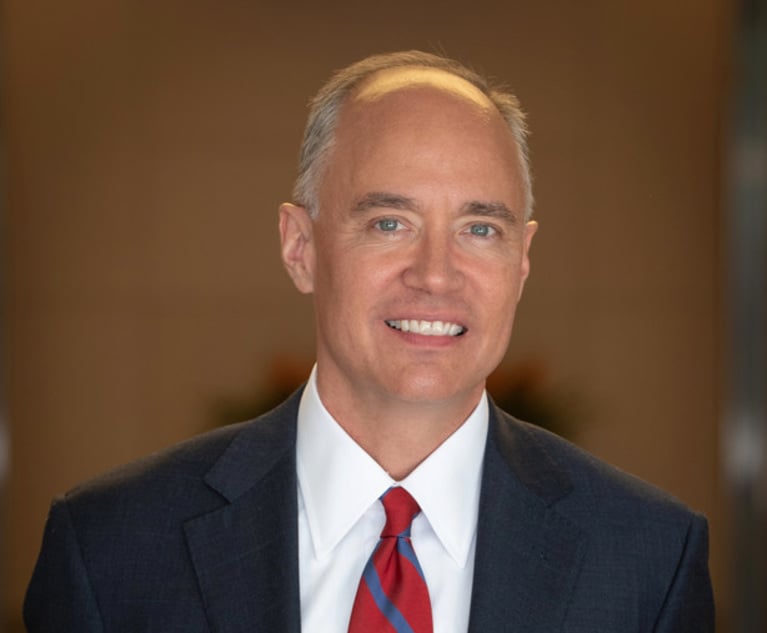Validity of Obamacare Argued Before Fifth Circuit in Challenge Led by Texas
Attorneys debate whether a little, any or all of the Affordable Care Act should be declared unconstitutional.
July 10, 2019 at 10:05 AM
5 minute read

With health insurance availability, cost and coverage on the line for millions of Americans, a federal appeals court seemed inclined to rule the core provision of President Barack Obama's signature health care law is unconstitutional.
Two Republican-appointed judges on a three-judge panel of the U.S. Court of Appeals for the Fifth Circuit peppered lawyers defending the law with skeptical questions Tuesday, appearing to suggest they might hold that when Congress zeroed out a tax imposed by the law in 2017 it rendered unconstitutional the mandate to purchase health insurance.
It was less clear after the arguments whether the judges also would invalidate the entire health care law as the Trump administration favors.
The hearing in New Orleans marked the latest development in a 2018 lawsuit by 18 Republican-leaning states claiming the absence of a tax converts the law into an unconstitutional directive to U.S. citizens to buy a product. A lower court ruled in December that it did and the entire law must fall as a result. That includes popular provisions such as protection for pre-existing conditions.
As Judge Jennifer Walker Elrod questioned the law's supporters — attorneys for 20 Democratic-leaning states and the U.S. House — she said the law's “command” that people buy insurance appeared intact without the tax penalty, and she questioned the mandate's constitutionality.
Judge Kurt Engelhardt seemed to agree. And he pointedly suggested the courts shouldn't have to work out what parts of the law should or shouldn't survive.
“Congress can fix this,” he said at one point.
It was unclear when the panel would rule. The case is likely headed to the U.S. Supreme Court, where the same five-justice majority that has twice voted to uphold the law — in 2012 and 2015 — remains in place.
“This is a political solution that you, various parties, are asking the court to roll up its sleeves and get involved in,” Engelhardt said at one point near the end of arguments.
But Douglas Letter, an attorney for the House, argued that eliminating the tax penalty didn't undermine the law's constitutionality. And he said Supreme Court precedent dictates that the courts should strive to uphold as many of the law's provisions as possible.
“Remember that the kinds of provisions here that would be struck down if there's no severability are, for example, the provision about when you can be denied or charged more insurance for pre-existing conditions,” Letter said. “The provision about children can be kept on parents' insurance until they're 26.”
The ultimate outcome will affect protections for people with pre-existing conditions, Medicaid expansions covering roughly 12 million people, and subsidies that help about 10 million others afford health insurance.
Obama signed the health care act into law in 2010.
The lawsuit, spearheaded by the Texas attorney general's office, was filed after Congress in 2017 zeroed out a tax the Affordable Care Act imposed on people without insurance. Republicans tried but failed to win full repeal of Obamacare as Trump wanted.
In challenging the law anew, Obamacare opponents cited the Supreme Court's 2012 ruling upholding the legislation. In that ruling, conservative justices rejected the argument that Congress could require everyone to buy insurance under the Constitution's interstate commerce clause. But Chief Justice John Roberts, joining four liberal justices, said Congress had the power to impose the tax.
Among the arguments by the law's supporters: Those who filed suit have no case because they aren't harmed by a tax that doesn't exist; the reduction of the tax penalty to zero could be read as a suspension of the tax, but the tax's legal structure still exists; and if the individual mandate is now unconstitutional, that doesn't affect the rest of the law.
When the law was proposed, friends and foes of Obamacare agreed the tax on the uninsured was essential to persuade healthy people to buy coverage and keep premiums in check. This year — the first time no fines will be collected — the number of people signing up for subsidized private insurance through the Affordable Care Act slipped only slightly.
The government said in March that 11.4 million people signed up during open enrollment season, a dip of about 300,000 from last year.
Circuit Judge Carolyn Dineen King asked no questions Tuesday. She was nominated to the appeals court by Democratic President Jimmy Carter in 1979. Elrod was nominated by Republican President George W. Bush in 2007. Engelhardt was nominated by Trump last year.
Democrats in the U.S. Senate said Monday that Republicans will pay a political price if the case results in the loss of the popular health care law.
“If they are successful in striking down the Affordable Care Act, Republicans will own all of the consequences,” Senate Democratic Leader Chuck Schumer of New York said on a call Monday with reporters.
Asked about the court case, Senate Majority Leader Mitch McConnell promised lawmakers would uphold protections for people with pre-existing medical conditions if the health law is struck down.
“There's nobody in the Senate not in favor of covering pre-existing conditions, nobody,” the Kentucky Republican said, adding he thinks it's likely the case will go back to the Supreme Court.
However, McConnell did not promise the divided Congress would be able to pass a replacement for the ACA as Republicans assured the public they would do.
Kevin McGill and Rebecca Santana report for the Associated Press.
This content has been archived. It is available through our partners, LexisNexis® and Bloomberg Law.
To view this content, please continue to their sites.
Not a Lexis Subscriber?
Subscribe Now
Not a Bloomberg Law Subscriber?
Subscribe Now
NOT FOR REPRINT
© 2024 ALM Global, LLC, All Rights Reserved. Request academic re-use from www.copyright.com. All other uses, submit a request to [email protected]. For more information visit Asset & Logo Licensing.
You Might Like
View All
Revisiting the Boundaries Between Proper and Improper Argument: 10 Years Later
8 minute read
'Serious Disruptions'?: Federal Courts Brace for Government Shutdown Threat
3 minute read
Uber Not Responsible for Turning Over Information on 'Dangerous Riders' to Competitor, Judge Finds
5 minute read
Infant Formula Judge Sanctions Kirkland's Jim Hurst: 'Overtly Crossed the Lines'
4 minute readTrending Stories
- 1The Key Moves in the Reshuffling German Legal Market as 2025 Dawns
- 2Social Media Celebrities Clash in $100M Lawsuit
- 3Federal Judge Sets 2026 Admiralty Bench Trial in Baltimore Bridge Collapse Litigation
- 4Trump Media Accuses Purchaser Rep of Extortion, Harassment After Merger
- 5Judge Slashes $2M in Punitive Damages in Sober-Living Harassment Case
Who Got The Work
Michael G. Bongiorno, Andrew Scott Dulberg and Elizabeth E. Driscoll from Wilmer Cutler Pickering Hale and Dorr have stepped in to represent Symbotic Inc., an A.I.-enabled technology platform that focuses on increasing supply chain efficiency, and other defendants in a pending shareholder derivative lawsuit. The case, filed Oct. 2 in Massachusetts District Court by the Brown Law Firm on behalf of Stephen Austen, accuses certain officers and directors of misleading investors in regard to Symbotic's potential for margin growth by failing to disclose that the company was not equipped to timely deploy its systems or manage expenses through project delays. The case, assigned to U.S. District Judge Nathaniel M. Gorton, is 1:24-cv-12522, Austen v. Cohen et al.
Who Got The Work
Edmund Polubinski and Marie Killmond of Davis Polk & Wardwell have entered appearances for data platform software development company MongoDB and other defendants in a pending shareholder derivative lawsuit. The action, filed Oct. 7 in New York Southern District Court by the Brown Law Firm, accuses the company's directors and/or officers of falsely expressing confidence in the company’s restructuring of its sales incentive plan and downplaying the severity of decreases in its upfront commitments. The case is 1:24-cv-07594, Roy v. Ittycheria et al.
Who Got The Work
Amy O. Bruchs and Kurt F. Ellison of Michael Best & Friedrich have entered appearances for Epic Systems Corp. in a pending employment discrimination lawsuit. The suit was filed Sept. 7 in Wisconsin Western District Court by Levine Eisberner LLC and Siri & Glimstad on behalf of a project manager who claims that he was wrongfully terminated after applying for a religious exemption to the defendant's COVID-19 vaccine mandate. The case, assigned to U.S. Magistrate Judge Anita Marie Boor, is 3:24-cv-00630, Secker, Nathan v. Epic Systems Corporation.
Who Got The Work
David X. Sullivan, Thomas J. Finn and Gregory A. Hall from McCarter & English have entered appearances for Sunrun Installation Services in a pending civil rights lawsuit. The complaint was filed Sept. 4 in Connecticut District Court by attorney Robert M. Berke on behalf of former employee George Edward Steins, who was arrested and charged with employing an unregistered home improvement salesperson. The complaint alleges that had Sunrun informed the Connecticut Department of Consumer Protection that the plaintiff's employment had ended in 2017 and that he no longer held Sunrun's home improvement contractor license, he would not have been hit with charges, which were dismissed in May 2024. The case, assigned to U.S. District Judge Jeffrey A. Meyer, is 3:24-cv-01423, Steins v. Sunrun, Inc. et al.
Who Got The Work
Greenberg Traurig shareholder Joshua L. Raskin has entered an appearance for boohoo.com UK Ltd. in a pending patent infringement lawsuit. The suit, filed Sept. 3 in Texas Eastern District Court by Rozier Hardt McDonough on behalf of Alto Dynamics, asserts five patents related to an online shopping platform. The case, assigned to U.S. District Judge Rodney Gilstrap, is 2:24-cv-00719, Alto Dynamics, LLC v. boohoo.com UK Limited.
Featured Firms
Law Offices of Gary Martin Hays & Associates, P.C.
(470) 294-1674
Law Offices of Mark E. Salomone
(857) 444-6468
Smith & Hassler
(713) 739-1250






